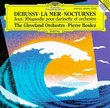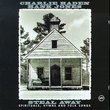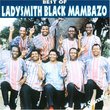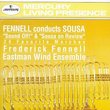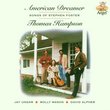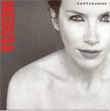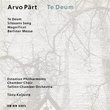| All Artists: Kronos Quartet/ Henryk Gorecki Title: Henryk Gorecki: String Quartet No. 3...songs are sung Members Wishing: 0 Total Copies: 0 Label: Nonesuch Original Release Date: 1/1/2007 Re-Release Date: 3/20/2007 Genre: Classical Styles: Chamber Music, Symphonies Number of Discs: 1 SwapaCD Credits: 1 UPC: 075597999334 |
Search - Kronos Quartet/ Henryk Gorecki :: Henryk Gorecki: String Quartet No. 3...songs are sung
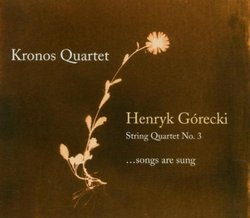 | Kronos Quartet/ Henryk Gorecki Henryk Gorecki: String Quartet No. 3...songs are sung Genre: Classical
Henryk Mikolaj Górecki's String Quartet No. 3, Piesni Spiewaja ("...Songs Are Sung"), Op. 67--like its predecessors--was especially commissioned for and dedicated to the Kronos Quartet, whose impassioned, sympathetic ... more » |
Larger Image |
CD DetailsSynopsis
Amazon.com Henryk Mikolaj Górecki's String Quartet No. 3, Piesni Spiewaja ("...Songs Are Sung"), Op. 67--like its predecessors--was especially commissioned for and dedicated to the Kronos Quartet, whose impassioned, sympathetic performance burnishes it to a fare-thee-well. Approximately a decade of fits and starts separated the work's completion from its premiere, which finally took place in the composer's native Poland on October 15, 2005. Fans of his elegiac, incongruously popular Third Symphony likely somewhat startled by the spiky, dissonant virility that informs so much of Górecki's output. But the present piece would be an ideal follow-up for admirers of his more mystical, minimalist style. Consisting of five movements, it is far longer than either of the previous quartets, commencing with a folkloric theme that seems to pace hesitantly, escalating into slashing anxiety before resolving back into its original loping gait. The somberly serene second movement, with its hymn-like secondary motif, gives way to the borderline frenzy of the third, which periodically veers off into a sweepingly romantic melody. The expository phrase of movement four evokes ectoplasmic recollections of Tchaikovsky's Serenade For Strings, progressing to a throbbing, dance-like tune overlooked by a reedy violin, ultimately fading into prayerful murmuring. The work closes with a peaceful meditation whose emotionally remote wandering is warmed by moments of smiling, reminiscent tenderness. --Christina Roden Similarly Requested CDs
|
CD Reviews"Symphony" of Suffering Songs Chris Speaks | Winston-Salem, NC | 04/24/2007 (4 out of 5 stars) "Before I begin this review, let me clear the air of a few things which you, the reader, ought to know about me, the reviewer: For one, within the realm of composed music, the string quartet is among my least favorite of all forms of chamber music. I personally find the interplay between violins, violas, and cellos to be drab after the first movement. Very few composers have composed a work for string quartet which has caused me to reconsider: Alvin Lucier is one, as well as Stockhausen. Not even Mozart or Shostakovich has captivated me in regards to the quartet. Second, I don't especially like a majority of the music which the Kronos Quartet chooses to play, even though I find it more listenable than the pseudo-sophisticated avant-garde which the Arditti Quartet chooses to play. I often find that the Kronos Quartet and Arditti Quartets both fall rather flat when it comes to innovation, though I would always vote in favor of the Arditti Quartet when it comes to talent and technicality. Having stated my disapprobations, then I am prepared to say that I found this piece, by Gorecki, of whom I'm an admirer, to be quite exceptional insofar that it's one of the few works for string quartet by the Kronos Quartet which has given me reason to reconsider my common misgivings about ALL string quartets. The dynamic interplay between violins, viola, and cello is so subtle that, during certain passages, when the texture has changed so significantly, as during the third and fourth movements, one finds it hard to believe any terrain has been covered at all. This is far from a criticism when one considers the appropriate dirge-like imagery which is evoked by the haunting voices calling from the grave. "Death" and "mortality" are the underlying themes of this work, through and through. Even the subtitle, "...songs are sung", comes from the four-line poem by Russian writer Velimir Khlebnikov, "When people die, they sing songs." not only that, but Gorecki even marks the fourth movement as MORBIDO. In fact, I personally find that this music would be extremely fitting for a documentary about the concentration camps and post-WWII, early Cold War sufferings in Poland with black-and-white film footage. And perhaps that's what Gorecki had in mind. The famous Symphony No. 3 was subtitled "Sorrowful Songs." How fitting it would be to call String Quartet No. 3 "Songs of Suffering." But it's not an atrocious suffering which Gorecki brings to the forefront. Oh, heavens no! Gorecki presents in the format of a score a sense of upset and suffering which we, the listener, are not affronted by, but one in which we are drawn into it, feel a stately compassion for each other and ourselves, and he allows the piece to finish itself in the most majestic of manners by having us realize that all which we've been listening to for the past 50 minutes is what we are, who we are, and where we are. Truly, Gorecki and the Kronos Quartet have given me hope in the string quartet." 'When people die, they sing songs' Grady Harp | Los Angeles, CA United States | 09/02/2007 (5 out of 5 stars) "Like so many of Henryk Mikolaj Górecki's compositions, his String Quartet No. 3, Opus 67 is inspired or at least references poetry: in the case of this quartet (1994-1995) the poem at its base is a simple four line poem by Russian writer Khlebnikov - "When horses die, they breathe,/ When grasses die, they wither,/ When suns die, they go out,/ When people die, they sing songs." Górecki is a master of sharing the most intimate interstices of the human soul in his haunting music and his third string quartet is for this listener on of his most intimate utterings. It is performed with consummate skill and grace and understated passion by the Kronos Quartet for whom the work was written. It is long (around 50 minutes) but every moment contains substance and beauty. Some listeners may find the degree of invention subdued and at first hearing that response is understandable. Yet listening to the work multiple times the soulful dignity as well as the inherent optimism of a musical poet sharing a life painted in terror and grounded by the folk music of his native Poland becomes increasingly apparent. There are moments that mark Górecki's sound, slow massive movement of a single repetitive chord altered only by the pulsations of viola or violin. But there are new sounds here: in the second movement marked 'Largo, Cantabile' the string quartet assumes the intonation usually associated with an old fashioned accordion, while in movements single string motifs blossom into romantic songs that are at times suggestive of love songs/folk songs and at other times of sacred hymns. This Third Quartet, so exceptionally well played by the Kronos Quartet, is far more meditative than extroverted. Górecki speaks to the quiet places within our memories and our minds and somehow makes those private places audible with music so gentle that it defies description. Grady Harp, September 07" A classic for the ages H. Patrick | Tucson, AZ | 06/11/2008 (5 out of 5 stars) "Once discovered/popularized this work (commissioned for Kronos) will stand beside other great works of the genre such as the Beethoven late quartet with the original finale(Grosse Fugue) and the Schubert string quintet in C major.
The technical recording/reproduction are excellent. A good indication of your lasting appreciation might be that your first listening might leave you confused/disappointed. After the third listening I was hooked." |

 Track Listings (5) - Disc #1
Track Listings (5) - Disc #1

